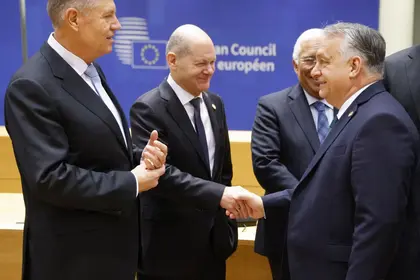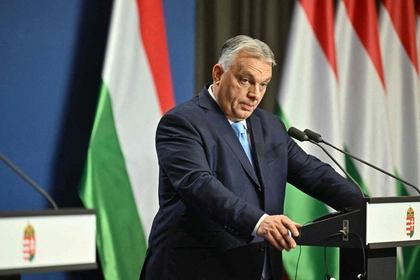The decision was awaited with bated breath, but now the EU's 50-billion-euro aid package for Ukraine for the period up to and including 2027 has been agreed. Hungary gave up its resistance after intensive negotiations in which it was reportedly agreed that the financial aid would be reviewed every two years, although any changes would require a unanimous decision. Commentators are only partially relieved.
Good news for Kyiv
JOIN US ON TELEGRAM
Follow our coverage of the war on the @Kyivpost_official.
Ukraine is now protected from mood swings in Budapest, Ukrainska Pravda concludes with satisfaction:
“The exact conditions for the allocation of funds have yet to be finalised, since they were only outlined in brief at the summit. Nevertheless it can already be said with confidence that this is a very positive decision for Ukraine. Especially because a number of ultimatums from Hungary were overcome along the way, which were aimed at making Ukraine dangerously dependent on any mood swings in Budapest. At the same time the compromise reached at the EU summit allows Orbán to 'sell' it as another victory at home in Hungary, or in other words, to save face.”
An astute player
Of course Orbán backed down, scoffs Corriere della Sera:
“He's an aspiring autocrat, he rules over a corrupt, brutal system and knows no scruples. But no one can deny his sure instincts. As the doyen of European summits, the Hungarian leader knows how to read a room full of leaders. He knows how to extract the maximum price despite his country's low clout, but he also knows when it is time to withdraw. ... Yesterday in Brussels Orbán sensed that he had to relent. If he hadn't done so he would have had to kiss goodbye to the 20 billion euros in European funds for Hungary. ... These funds account for more than 10 percent of the Hungarian economy.”

‘Europe Must Stand Up’ – EU Lawmakers Clash Over Trump’s Return, Musk’s Political Meddling
Cracking down on Orbán
The EU is toughening up and refusing to be pushed around, observes Népszava:
“Orbán has been forced to give in to the EU twice in the space of six weeks. ... As Austrian Chancellor Karl Nehammer said in a brief statement, Viktor Orbán is 'back on board'. It's not clear exactly who the prime minister is on board with, but he has certainly achieved one thing: the European Council and the EU Commission are beginning to surpass their master in cunning and sending Orbán ever stronger messages to make clear who's the boss. The EU institutions no longer have any qualms about resorting to blackmail.”
Nowhere near enough
The EU needs to think in completely different dimensions, Politiken insists:
“If Russia wins the war, it will be a disaster not only for the Ukrainians, but for the whole of Europe. Europe is much, much richer and has far more resources than Russia. But while the EU will only spend just under a thousandth of its GDP on the conflict, Russia has converted its entire society to a war economy and increased defence spending to 6 percent of GDP. While we dither and fumble over our support, the Russians have gone all in. ... We need to invest much more in arms production so that we can offer more support and not be so dependent on the US.”
Link funds to conditions
The Frankfurter Allgemeine Zeitung puts forward two considerations:
“Firstly, it's essential that the EU should take a very close look at where the money goes in Ukraine. The recent cases of corruption in the military must not be repeated. They weaken fighting strength and morale among the troops. Secondly, Ukraine should put its house in order politically. Restricting democratic competition is not good for the country, as the power struggle between Zelensky and his commander-in-chief has clearly shown. Europe is investing in a geopolitical order in Ukraine that includes pluralism. This must be made clearer to Kyiv.”
The majority has the upper hand
Denník N is relieved that Slovakian Prime Minister Robert Fico did not join Viktor Orbán in opposing the broad EU majority that supports the aid package for Ukraine:
“Regardless of what Fico says publicly, what really counts in the end is the actions that Slovakia takes in support of Ukraine. ... The fact that Orbán backed down shows that politicians like him and Robert Fico are only afraid of losing money. ... Fico realised that things were getting serious. And that he was genuinely at risk of losing money if he sided with Orbán against all of Europe. ”
Orbán remains a risk
The EU is not out of the woods yet, fears Helsingin Sanomat:
“The EU is still on the verge of taking the historic step of excluding Hungary from decision-making in the EU. A majority in the European Parliament is demanding this from the Commission and member states, and many countries are more willing than before to take really tough measures against Hungary. Even though Orbán has now agreed to support Ukraine, he is a constant risk. Hungary is undermining the EU's security policy, and soon Orbán will take over the EU presidency. Ukrainian President Volodymyr Zelensky politely thanked the EU for its strong unity. But Ukraine must be able to count on long-term and reliable support.”
You can also highlight the text and press Ctrl + Enter










